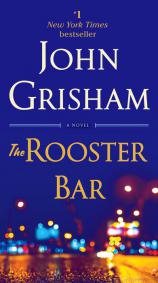The Rooster Bar
Review
The Rooster Bar
In his Author’s Note at the conclusion of THE ROOSTER BAR, John Grisham explains to readers how the plot of his 33rd novel came about.
An investigative article in the September 2014 edition of The Atlantic magazine by Paul Camp chronicled the evils of many “for-profit” law schools that operate independent of traditional colleges. They are far less selective in the students they admit to their institutions; in fact, many with low GPAs and LSAT scores are accepted. Once this happens, the ability to pay tuition seems to determine whether or not they receive passing grades. Although great legal careers are promised before admission, many graduates are unable to find meaningful jobs and have difficulty passing the bar exam, a requirement to practice law. Students, having borrowed heavily to pay tuition and living expenses, find themselves burdened with a mountain of debt and no ability to earn sufficient income to repay their loans.
While some “for-profit” law schools have existed for decades, the recent explosion of them coupled with some newsworthy failures have become an issue in the American legal system. And Grisham is never reluctant to base his novels on the flaws and failures of our legal system. Whether it be the death penalty, the buying of judicial elections, the militarization of our police, or mass-tort litigation and class action abuse, he is always willing to take on such issues in his fiction. At the same time, he manages to educate readers while not preaching and does so in entertaining and enjoyable books that often provoke stimulating debate among the legal community. THE ROOSTER BAR is no exception.
"There are no good guys in this novel, just bad guys and really bad guys. Fortunately, the bad guys have enough good in their hearts to make their exploits endearing."
The story opens with four aspiring third-year law students entering their final semester at Foggy Bottom Law School in Washington, D.C. Mark Frazier, Todd Lucero, Gordon Tanner and Zola Maal should be interviewing for jobs and preparing for the bar exam. Instead they have come to the stark realization that all of the optimism and false hopes they have been sold by their law school are meaningless. They will finish law school with more than a hundred thousand dollars of student loan debt and no way to pay.
As their last semester reaches the halfway point, Gordon provides his friends with evidence of a complicated financial shell game that rewards the secret owners of the “for-profit” institutions at both ends of the law school process. In addition to hefty tuition commensurate with expensive private colleges, the owners are rewarded on the back end of the process because they secretly own the lending institutions that process and collect the student loans. Gordon’s evidence results in tragic consequences for him. His friends vow to extract some revenge from the legal system, and while attending court one day to help him, they realize that it is easy to play lawyer in the real world. A nice suit and an air of arrogance in the high-volume courtrooms of major cities can go a long way towards convincing someone in need of a lawyer that the person they meet in the courtroom hallway can help them. They never ask to see a resume or diploma.
There is truth in what Grisham writes about the unauthorized practice of law. There are news reports on a regular basis about people impersonating attorneys only to be exposed at some point in the legal proceedings. While bar associations and attorney registration groups work hard to combat the problem, sometimes the counterfeit lawyer goes quite a distance on the legal highway before getting caught. In fact, there are occasions when they do better than their licensed legal brothers and sisters.
Grisham adds a side plot chronicling the difficulties that Zola and her family are encountering with immigrations issues. The family came to America from Africa, and now her parents and brother face a forced return to a country where they have not lived for decades. Grisham’s description of what happens to them is chilling.
As Shakespeare observed, “to do a great right do a little wrong.” That may be the lesson of THE ROOSTER BAR. There are no good guys in this novel, just bad guys and really bad guys. Fortunately, the bad guys have enough good in their hearts to make their exploits endearing.
Reviewed by Stuart Shiffman on October 27, 2017




